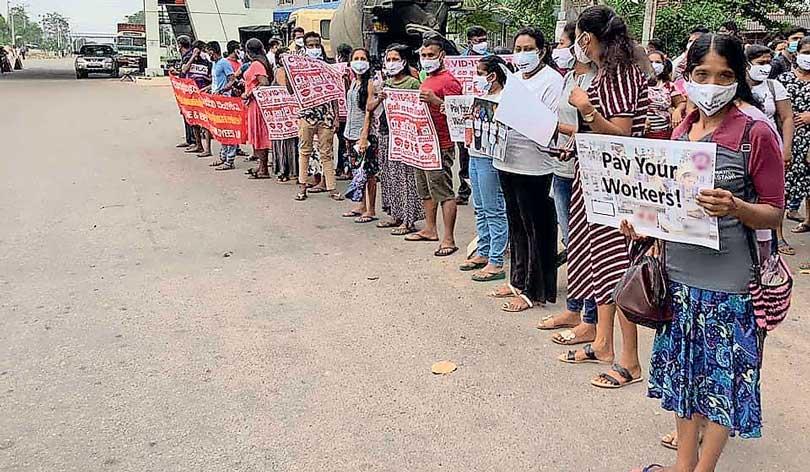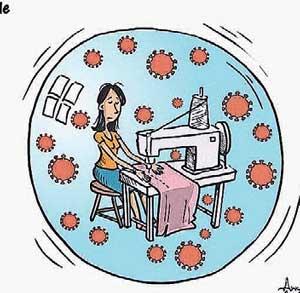25 May 2021 - {{hitsCtrl.values.hits}}

 The Asia-Pacific region has been termed the ‘clothing factory of the world’ as it accounts for 60 percent of the world’s total apparel exports according to statistics compiled by the International Labour Organisation (ILO). The garment sector in Sri Lanka is an important source of income and employment which contributes six percent to Sri Lanka’s Gross Domestic Product (GDP). With the onset of COVID-19 pandemic, apparel manufacturers estimated a loss of USD 1.5 billion, but amidst drastic conditions, apparel industry workers were expected to work. The emergence of the Minuwangoda COVID cluster is one such example. Recently, as many as 400 garment factory workers tested positive at a garment factory in Thulhiriya, prompting authorities to launch a probe. However, rights groups claim that workers’ rights have been violated as factories continue operations further exploiting workers.
The Asia-Pacific region has been termed the ‘clothing factory of the world’ as it accounts for 60 percent of the world’s total apparel exports according to statistics compiled by the International Labour Organisation (ILO). The garment sector in Sri Lanka is an important source of income and employment which contributes six percent to Sri Lanka’s Gross Domestic Product (GDP). With the onset of COVID-19 pandemic, apparel manufacturers estimated a loss of USD 1.5 billion, but amidst drastic conditions, apparel industry workers were expected to work. The emergence of the Minuwangoda COVID cluster is one such example. Recently, as many as 400 garment factory workers tested positive at a garment factory in Thulhiriya, prompting authorities to launch a probe. However, rights groups claim that workers’ rights have been violated as factories continue operations further exploiting workers.
No relief, only
hard work

Speaking at a press conference organised by Asia Floor Wage Alliance – an international campaign and alliance for collective industrial bargaining in the global garment industry, Chamila Thushari representing Dabindu Collective opined that responsible authorities haven’t taken the first and second COVID waves as examples to contain the third wave. “No PCR tests are being conducted in garment factories in Katunayaka, Biyagama, Thulhiriya, Kilinochchi and Vavuniya where 200-300 positive cases have been found. If 100 PCRs are done, around 20-30 workers always test positive. The authorities aren’t conducting PCR tests adequately. Workers who test positive are being kept for 5-6 days at hostels and then taken to Jaffna and faraway places for quarantining. After 2-3 days they are brought back to the hostels without treatment. They don’t have a way to find out the result of their PCR tests. The companies are deliberately hiding this information. It’s the apparel sector that’s contributing to the economy at this point and according to Central Bank reports the apparel sector has gained profits despite this crisis.” said Thushari.

This is a crisis situation. If one worker tests positive she’s likely to infect 20-50 others in the same hostel. They have to use a common toilet. There aren’t many trade unions to voice for the rights of garment factory workers. Right now workers don’t have any sort of relief. All task forces cover up company owners
Chamila Thushari representing Dabindu Collective
 “During the first and second waves of the pandemic many garment workers lost their jobs. Out of around 500,000 workers only 200,000 remained and are contributing to the economy. So why aren’t these workers being tested? We urge the Government to administer vaccines and conduct PCR tests because many factory workers are women who are under 30. There are no health guidelines in place. This is a crisis situation. If one worker tests positive she’s likely to infect 20-50 others in the same hostel. They have to use a common toilet. There aren’t many trade unions to voice for the rights of garment factory workers. Right now workers don’t have any sort of relief. All task forces cover up company owners. Who’s going to intervene? We urged authorities to grant them paid leave, but if they are quarantined their allowances and salaries are being deducted. Manpower workers on the other hand don’t have any opportunity of getting PCR tests done. Pregnant mothers too are unsafe in this environment,” she opined.
“During the first and second waves of the pandemic many garment workers lost their jobs. Out of around 500,000 workers only 200,000 remained and are contributing to the economy. So why aren’t these workers being tested? We urge the Government to administer vaccines and conduct PCR tests because many factory workers are women who are under 30. There are no health guidelines in place. This is a crisis situation. If one worker tests positive she’s likely to infect 20-50 others in the same hostel. They have to use a common toilet. There aren’t many trade unions to voice for the rights of garment factory workers. Right now workers don’t have any sort of relief. All task forces cover up company owners. Who’s going to intervene? We urged authorities to grant them paid leave, but if they are quarantined their allowances and salaries are being deducted. Manpower workers on the other hand don’t have any opportunity of getting PCR tests done. Pregnant mothers too are unsafe in this environment,” she opined.
Outright slavery
“It’s outright slavery at the FTZ,” claimed Ashila Dandeniya of Standup Movement Lanka, an organisation striving to promote rights and entitlements of workers in Economic Processing Zones (EPZs). “Their safety is not accounted for. We observe that PCR tests are being done so that the results won’t hinder the daily outcome of apparel productions at these factories. Sending workers to quarantine is also happening in an ad hoc manner. Previously if one person tested positive, her close contacts too were sent for quarantine. But now it’s only the positive case that’s sent for quarantining. Others are expected to work. So how safe are they? Where is the Labour Ministry? We don’t even feel that there’s such a Ministry with the silence they have maintained. Many other authorities are trying to mislead us with false information. If we take the quarantine process there are no  quarantine centres in the district or province. They are taken to an isolated area and deliberately returned to their hostels without a proper assessment of their health condition. Some are left on the road. This is an inhumane operation by the tri-forces. Close to 50% of garment factory workers are victimised as a result of the pandemic. We urge the authorities to grant them leave for a period of two weeks, but this shouldn’t affect their allowances. Why are responsible authorities silent? They should arrive at a decision. Health authorities have warned that we are in a critical situation. We suspect whether workers at FTZ would have to work even if the country goes into a lockdown. The Government should provide relief to these workers and if not the relevant companies should intervene and ensure their wellbeing” said Dandeniya.
quarantine centres in the district or province. They are taken to an isolated area and deliberately returned to their hostels without a proper assessment of their health condition. Some are left on the road. This is an inhumane operation by the tri-forces. Close to 50% of garment factory workers are victimised as a result of the pandemic. We urge the authorities to grant them leave for a period of two weeks, but this shouldn’t affect their allowances. Why are responsible authorities silent? They should arrive at a decision. Health authorities have warned that we are in a critical situation. We suspect whether workers at FTZ would have to work even if the country goes into a lockdown. The Government should provide relief to these workers and if not the relevant companies should intervene and ensure their wellbeing” said Dandeniya.
Vaccine inequality
“The FTZ has become a free COVID distribution Centre,” opined Chandra Devanarayana of Revolutionary Existence for Human Development (RED) – a non-profit organisation dedicated to empower women and women workers in free trade zones of Sri Lanka. “There are infected workers in many hostels at FTZ. None of the companies or authorities has taken steps to isolate them. Some have quarantined themselves inside boarding rooms for 14 days. They aren’t unable to come out of their hostels and they are being stigmatised. They are unable to use the toilets or cook. Some companies don’t even provide them with food. Many factories in Thulhiriya, Pudukudirippu, Biyagama have been closed down. But officials say that production has to proceed. But even to do so these workers should live first. Pregnant mothers are supposed to work from home, but is it only the pregnant mothers in public service who should take care of themselves? We request that pregnant mothers employed in the private sector too should be granted paid leave. People in Katunayake are being given the vaccine, but priority should be given to garment factory workers. However only few workers have been given the vaccine. If they aren’t given the vaccine who’s going to be responsible for their lives? Most PHIs aren’t aware of positive cases in the area as well,” she added.
No complaints received
Several organisations voicing for the rights of garment factory workers sent a list of demands to various authorities including the Labour Ministry, Labour Department (BOI) and the Board of Investments on May 15. However when inquired Labour Department Commissioner General Prabath Chandrakeerthi said that he hasn’t received any complaints regarding apparel workers in free trade zones. “Free Trade Zones come under the purview of the BOI and they should be coordinating vaccines, PCR tests etc. However if there’s a violation of Labour rights such as if workers in lockdown areas are being called to work or if a worker is expected to work even if they are in poor health conditions, then we would intervene. But so far we haven’t received any complaints as such.”
National responsibility to continue operations
A document including revised health guidelines for garment factory workers, updated as at April 2021, has been uploaded to www.investsrilanka.com, a website managed by BOI. The guidelines however are clear on what needs to be done if a worker tests positive. It states that first line contacts should be isolated and sent for quarantine.
In an earlier instance BOI Chairman Sanjaya Mohottala has urged all apparel factories to comply with health guidelines while stressing the need to continue the manufacturing process describing it as a national responsibility. He has further stated that factories have been instructed to act as a Bio-security Bubble to contain the spread of the pandemic.
Several attempts to contact Labour Minister Nimal Siripala De Silva proved futile.
23 Apr 2024 32 minute ago
23 Apr 2024 2 hours ago
23 Apr 2024 3 hours ago
23 Apr 2024 3 hours ago
23 Apr 2024 3 hours ago